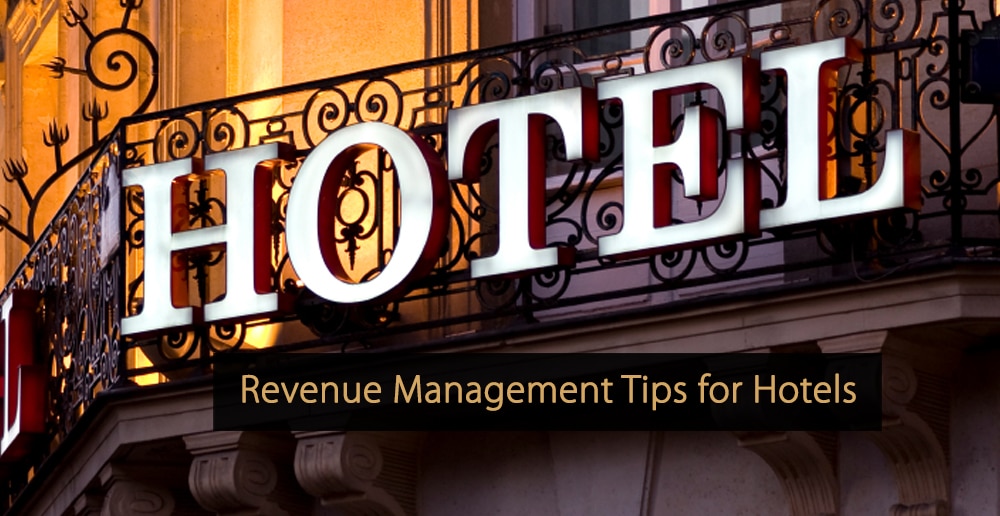Revenue management within the hospitality industry involves predicting consumer demand to optimize sales, allowing businesses to sell at the right price to the right customer at the right time. In a hotel, this may mean turning away business now to do more profitable business tomorrow. When carried out correctly, revenue management can be extremely effective, helping companies significantly boost their profit margins. Here, we provide 12 revenue management tips for hotels.
Table of Contents:
- 1. Create a Revenue Management Culture
- 2. Invest in AI & Machine Learning
- 3. Implement Voice Technology and Chatbot Revenue Features
- 4. Choose the Right Pricing Strategy
- 5. Maintain Accurate Records
- 6. Monitor Rival Hotels and Resorts
- 7. Offer Incentives for Direct Booking
- 8. Be Aware of Changing Customer Habits
- 9. Place a Focus on Selling Value
- 10. Use Predictive Analytics for Demand Forecasting
- 11. Only Use Automation in the Right Places
- 12. Prioritize Mobile Optimization
- 13. Implement Open Pricing
- 14. Embrace Technology
- 15. Consider Ancillary Revenue Management Strategies
- 16. Employ an Omnichannel Data Analytics Approach
- 17. Perform Guest Segmentation
- 18. Optimize Length of Stay Controls
- 19. Focus on Customer Retention
- 20. Work Across Departments
- What is Revenue Management?
- What is Total Revenue Management?
1. Revenue Management Culture
The first of our revenue management tips involves creating a revenue management culture within your organization. What does this mean? Essentially, it means that revenue management should not be left entirely to the major decision-makers; it is something everyone should be aware of.
Gallup research shows that businesses with higher employee engagement are 22% more profitable and 21% more productive, while suffering significantly less turnover. Moreover, 65% of all lost customers can be traced back to a disengaged employee.
McKinsey’s AI in the Workplace report shows that organizations with engaged employees experience significantly higher profitability, with AI-enhanced training programs showing particular promise for revenue optimization.
By creating an awareness of revenue management and why it is important to your hotel, you can encourage positive behaviors from all staff members. If they realize why it is necessary, they are more likely to take care when recording data and more likely to utilize that data to make good, knowledge-based decisions.
2. Invest in AI & Machine Learning
Artificial Intelligence (AI) and Machine Learning (ML) are transforming hotel revenue management by delivering faster, smarter decisions based on real-time data. These technologies analyze booking patterns, guest behavior, market trends, and competitor pricing to recommend optimal rates and strategies. Unlike traditional tools, AI systems learn over time, improving their accuracy with each data cycle.
According to the Artificial Intelligence – Worldwide Report by Statista, the global AI market size is projected to grow at a CAGR of 15.83% until 2030. Moreover, according to Oracle NetSuite, analysts estimate that the AI market in hospitality was about $90 million in 2023. It is projected to grow by 60% annually, reaching over $8 billion by 2033. This rapid expansion is because AI is woven into every part of hotel operations.
For example, Marriott Bonvoy introduced an AI-powered search feature in its Homes & Villas division, which spans 140,000 luxury home rentals.
Hotels that adopted AI-powered revenue management systems (RMS) in early 2025 saw an average 15% revenue increase, especially during low-demand periods. To get results, integrate an AI-ready RMS, train staff to interpret the data, and review performance weekly to keep improving with changing market conditions.
Video: 6 Ways AI is Used in Hospitality
3. Implement Voice Technology and Chatbot Revenue Features
Voice-activated technology and AI-powered chatbots are transforming guest interactions while creating new revenue opportunities. Voice-activated technology enables streamlined communication and enhanced service delivery, freeing up staff to focus on tasks requiring human interaction.
According to Statista, 57% travelers prefer voice assistants for in-room controls, while 48% use them for service requests. Most US hoteliers report improvements in guest satisfaction after deploying branded voice assistants (Alexa/Siri-based) at front desks or in-room devices.
Chatbots can handle upselling during the booking process, recommending relevant add-ons based on guest preferences and booking history. Automated guest service features can suggest spa appointments, dining reservations, or local attractions during chatbot interactions. It creates revenue opportunities without additional staff time.
According to Hotel Tech Report’s State of Guest Technology, 70% of hotel guests find chatbots useful for quick questions, with the top use cases being Wi-Fi password requests, wake-up call scheduling, and checking hotel facility operating hours. The research further reveals that 58% say AI improves their overall hotel experience, from booking to check-out.
A strong example comes from HotelPlanner.com, which launched AI travel agents that handled 40,000 customer inquiries and booked £150,000 worth of hotel rooms in just one month, as reported in Forbes. This shows how chatbots can improve service while driving real revenue.
4. Choose the Right Pricing Strategy
There are many different pricing strategies, and no one strategy will guarantee success. Instead, those in the hospitality sector need to consider the best strategy for their particular hotel based on what they have to offer, who they are trying to attract, and what strategy their competitors are employing.
A competitive pricing strategy, where prices are set based on other hotels’ prices, puts your business in direct competition and is good when your hotel has more to offer than your rivals do.
According to a study published in PMC, hotels using economic pricing strategies that position themselves competitively in the market saw significant benefits. The study found that a 5% increase in customer retention can lead to a profit increase of between 20% and 90%. This shows that the right competitive pricing approach not only attracts guests but also keeps them coming back.
Yet, a discount strategy might be best in slow seasons because a low-paying customer is better than an empty room. Another option is the value-added approach, where rates are higher, but additional value is provided through extras and freebies.
5. Maintain Accurate Records
Data collection is at the heart of the revenue management process, and the data your hotel gathers will form the basis for almost all of your decision-making. Yet, some hotels collect too much data, which only confuses matters. It is, therefore, vital that records are relevant and consistent.
In a survey of hotel investors undertaken by IDeaS, 83 % of hoteliers using revenue management technology described the return on investment (ROI) as ‘high’ (62 %) or ‘very high’ (21 %), but this success depends entirely on data quality.
Accurate forecasts do more than increase profit; they prevent costly missteps. According to HSMAI (Hospitality Sales and Marketing Association International), 72% of hotel managers reported that inaccurate forecasts led to pricing issues and missed revenue opportunities. This underscores the need for robust forecasting systems that use both machine learning and human expertise.
You need to identify exactly what information needs to be gathered and how that data should be recorded. Then, standard practices should be introduced to make life easier for those using it, ensuring that everyone involved in collecting that data uses consistent methods.
Video: Top 10 Tips for Successful Hotel Revenue Management
6. Monitor Rival Hotels and Resorts
To maximize revenue management efforts, it is important to be aware of what rival hotels are doing, especially when it comes to room rates and the services they offer. Monitoring rival hotels can help you to better understand the current state of the market. It can also help you identify services you can offer to differentiate your hotel.
Once you are clear on what your rivals have to offer and the prices they are charging, you can factor this information into your own decision-making. Some revenue management tips highlight the importance of tracking room rates, in particular, because sudden discounts from rival hotels can have a big impact on demand for your hotel.
EHL Professor Dr. Stefan Güldenberg states:
“Knowing the strengths and weaknesses of your competitors compared to your own is an important part of strategic management and organizational learning. Regular competitor analysis helps you to clarify or update your hotel strategy and to respond effectively to a constantly changing environment.”
7. Incentives for Direct Bookings
Incentives for direct bookings provide a compelling reason for customers to book their rooms directly with the hotel rather than using a third-party platform. Many revenue management tips are based on facilitating direct bookings because these bookings are not subject to commission fees or other hidden costs to the hotel.
According to the US Travel Market Report by Phocuswright, 51% of online bookings are made on the hotel’s direct booking engine. According to Skift Research’s Hotel Distribution Outlook, direct channels could potentially generate more than $400 billion of hotel gross bookings versus $333 billion from OTAs by 2030. This shift toward direct bookings represents a significant opportunity for hoteliers to reduce commission costs and increase profitability.
Hotels can provide guests who book directly with exclusive benefits, in order to encourage this approach, such as free upgrades. The absence of commission fees may also make it possible to charge a lower room rate to the customer and still earn more revenue. It is essential that your hotel website and booking engine are easy to understand and use.
8. Be Aware of Changing Customer Habits
A huge part of hotel revenue management involves using historical data to make present and future decisions. However, historical data can sometimes be relied upon too heavily, and hotel owners or hotel management can miss important changes that have occurred more recently.
Digital booking is now the norm. According to a Trends Global Survey, 80% of travelers prefer booking trips entirely online, with 86% of Millennials and 83% of Gen Z leading the shift. Demographic trends also show that 60% of hotel bookings in 2025 are expected to come from Millennials and Gen Z.
Personalized experiences are no longer optional—65% of guests say personalization is a top priority, and many are willing to pay up to 25% more for it. Meanwhile, 73% of travelers want to manage bookings, check-ins, and services via smartphone, and 96% of hoteliers are investing in tech to support contactless interactions.
Over the years, you will likely see changes in your customer base. These changes may be things like the average age of a guest, but they may be more subtle. For instance, you may notice a shift in how the average customer books a room. Keep your finger on the pulse as much as possible, and be aware of changing habits.
Table: Examples of Changing Customer Habits, Revenue Management Actions & Risks for Hotels
9. Place a Focus on Selling Value
One of the best hotel revenue management tips is to consider offering value as much as possible. Part of price optimization is understanding when you do not necessarily have to compromise on your prices. Indeed, delivering greater value for the same price is one way to achieve this. Personalization is a key part of this strategy. A study shows that 65% of guests are willing to pay up to 25% more for personalized experiences that match their needs.
By offering value-added extras, such as discounts on additional nights and even, when demand is low enough, a free additional night, you can afford to be braver with your prices, potentially resulting in greater revenue.
The industry is responding. According to an Oracle study, 81% of hoteliers expect a major shift in service models by 2025, and 49% strongly agree that upselling and offering special amenities are critical for revenue growth. Offering value rather than just cutting prices helps hotels stay competitive, attract high-value guests, and drive long-term profitability.
10. Use Predictive Analytics for Demand Forecasting
Clearly, anticipating demand is one of the most essential parts of any revenue management strategy, which requires forecasting. It is also important to forecast things like the availability of rooms and market share. However, you should also try to map where the demand comes from.
Hotels typically have access to excellent information about their guests, especially regarding where they are from. By comparing this information to historical data, it should be possible to identify areas where demand is growing and other associated trends, potentially leading to increased business from those regions.
As found in EY’s 2023 Hospitality Executive Financial Survey of CFOs at 30 leading travel and hospitality companies, even as the industry recovers, strong forecasting is key to managing uncertainty and finding new revenue opportunities.
Deloitte’s European Hotel Industry & Investment Survey shows that 81% of survey respondents expect RevPAR growth of one to five percent in London, while 70% anticipate similar growth in UK regions for 2025. This survey shows the importance of accurate demand forecasting for strategic planning.
Dr. Cindy Heo, Associate Professor of Revenue Management at EHL, explains,
“Demand forecasting plays a critical role in revenue management by providing data-driven insights into future customer behavior. Accurate forecasts allow hoteliers to set the right room rates, optimize inventory, and improve operational planning—all of which enhance revenue and guest satisfaction.”
11. Only Use Automation in the Right Places
Many hotels rely heavily on automation, and it can seem like a godsend. However, at times, automation can also be the enemy of effective revenue management, which requires complicated decisions to be made based on factors like supply, demand, the cost of making a sale, and so forth. According to PwC, over 70% of hotel executives are now leveraging technology solutions to automate parts of their operations and enhance staff productivity.
To be clear, automation still has a role within a revenue management strategy. After all, modern software can cope with fairly complicated decision trees, and you do not want staff to be bogged down by data entry. Yet, great revenue management also requires human decisions, thinking outside the box, and the occasional risk.

Nikhil Roy, Revenue & Pricing Manager, Key Hospitality B.V.“Automation is indeed a time saver and a huge help for the revenue management community. I expect it to grow even further and instead of replacing a Revenue Manager, it can assist them to make the correct decisions. As we have seen during the pandemic, an AI RM tool wasn’t the most reliable and RMs had to get a grip of the market situation and carve out potential revenue opportunities. However, I believe tasks such as daily and hourly rate updates, inventory optimization, weekly/monthly market updates and appropriate suggestions are best suited for such a tool as it helps the RM save a lot of time and energy.” Click here to learn how hotels can benefit from automation in revenue management from our Expert Panel. |
12. Prioritize Mobile Optimization
The next revenue management tip revolves around the mobile optimization of hotel websites. Mobile is now one of the single most important revenue streams. Indeed, Google recently revealed that mobile web searches are now outnumbering searches originating from desktops, while according to the Mobile Internet Usage Worldwide Report by Statista, the worldwide mobile device website traffic in 2023 was 54.7%.
In 2024, the mobile travel market was worth $228 billion, and it is expected to grow to over $526 billion by 2032. By 2026, more than half of all bookings will happen on mobile devices. That’s why hotels need to focus on mobile-first design and features.
Guests now expect everything to work smoothly on their mobiles. A recent survey found that 73% of people like to book, check-in, or request services using mobile devices, and 96% of hotels already offer some form of contactless service.
Accor Hotels shows how mobile optimization works in real life. The hotel made big improvements to its mobile app. They added features like online check-in and loyalty point payments. The results were impressive. Mobile bookings grew from 12% to 18% in just two years. Their app was downloaded over 5 million times. Website traffic doubled. Direct bookings increased by 20%. The takeaway is that mobile optimization drives real revenue growth.
13. Implement Open Pricing
Experts offering hotel revenue management tips often emphasize the value of embracing an open pricing model. In essence, this pricing strategy moves away from the fixed modifiers associated with many other approaches to pricing, allowing rates to be tailored based on the target audience, the channel, and your needs.
Open pricing allows hotels to utilize a wider range of price points and target specific market segments. It can also help hotels avoid situations where rooms are unsold because pricing does not meet the needs of the audience. Hotels can maximize earnings, while customers can benefit from more tailored rates.
For more information about open pricing, read “Open Pricing: Why Is It the Next Hotel Revenue Management Strategy”.
14. Embrace Technology
Many revenue management tips for hotels are focused on pricing and distribution, but it is important to understand the role that technology can play in making a hotel more desirable as well. Modern hotel guests expect to be able to use Wi-Fi and connect multiple devices with no friction and excellent performance.
Going further, guests are increasingly seeking hotels that use the Internet of Things (IoT) to provide greater control of rooms, more automation, and a seamless experience. Then, of course, hotels can attract more guests and charge more for rooms if they can use technology to innovate and provide added excitement.
Oracle research shows that 54% of hoteliers plan to implement technology that improves or eliminates the front desk experience by 2025, but this must be balanced with guest preferences for human interaction when needed.
15. Consider Ancillary Revenue Management Strategies
While room rates are a key element of revenue management, one of the hotel’s best revenue management tips is to diversify revenue streams as much as possible. An ancillary revenue management strategy makes this possible, with hotels offering additional products and services beyond the basics, like selling rooms at the right price.
Adopting this approach can help improve the guest experience while helping your hotel earn money, not subject to commission fees. Examples of ancillary services include spa services, leisure facilities, food and beverage services, event hosting, selling tours of local attractions, and more.
Examples of ancillary services include spa services, leisure facilities, food and beverage services, event hosting, selling tours of local attractions, and more. CBRE data shows U.S. hotel spas grew spa revenue per available room (PAR) by 12.6% from 2018 to 2022, with resort spas rising 14.2%.

Tanya Hadwick, Group Revenue & Yield Leader, SunSwept Resorts“An interesting question when working in ultra inclusive resorts, as it takes some real thought on how you can increase Ancillary Revenue. It comes down to what you have available to offer at additional costs, and what the guest is prepared to spend. For many, the aim of an all-inclusive is to have already budgeted the cost of the trip. From an F&B perspective, some examples include high-end specials, such as surf and turf with lobster and steak, champagne, high-end wines and exclusive wine paring menus. We typically use a variety of methods to update the guests, i.e., from using the in-room tablets to the team upselling. As a resort, we are lucky to have great spa facilities, where additional treatments can be suggested. We also have various water sports and one-on-one classes on offer. Having spent time looking at all the costings, we are also aware of when and how to mix and match with the rooms to secure the best results. It does however, all come down to the team’s engagement, how familiar they are, their level of comfort in suggesting items to the guests and whether or not they are incentivised to make such suggestions.” Click here to learn top ancillary revenue management strategies from our Expert Panel. |
16. Employ an Omnichannel Data Analytics Approach
Omnichannel data analytics takes a holistic approach to analyzing the data that is gathered through customer interactions across all channels. Rather than viewing the data within the confines of each individual channel, an effective analysis of omnichannel data will always look at the big picture.
Analyzing customer interactions in this way can provide useful insights and revenue management tips for hotels. For instance, it can draw attention to common pain points and issues experienced along the customer journey, provide information about customer expectations, or reveal trends in customer behavior.
For example, Marriott’s omnichannel campaign increased its conversion rate by 45% and reached 4.5 million households. Guests who saw ads on multiple channels were 1.8x more likely to visit the website and 3.8x more likely to book. In general, using 3+ marketing channels can lead to a 494% higher order rate compared to using just one.
As DJ Vallauri, CEO of Lodging Interactive, recently shared a quote:
“Omnichannel marketing considers all channels to create the best customer experience. By using a consistent strategy, hotels can develop stronger connections with guests and ultimately drive direct revenue.”
17. Perform Guest Segment
Instead of treating all guests the same, hotels should group them by dividing guests into smaller, more specific groups, called micro-segments. Instead of just using basic categories like “business” or “leisure,” hotels now look at guest behavior, booking habits, and spending patterns to create more targeted pricing and offers. For example, business travelers may pay more on weekdays, while families prefer bundled deals. Many hotels now use AI-powered systems that automatically adjust rates and promotions based on guest data.
Nooshi Akhavan, Director of Revenue Performance & Distribution at Coast Hotels, notes the transformation:
“Twenty years ago, there were just four segments: transient guest (business and leisure weren’t divided then), group guest, tour and wholesale, and crew. Today, I’ve seen hotel brands that have 18 market segments.”
A study published in the International Journal of Hospitality Management shows that room rates alone explain 64.6% of occupancy variability; demand spikes tied to segmentable events (e.g., conferences) can be capitalized through segment-specific pricing. IHG, for example, segments by purpose, business, leisure, crew, and customizes packages and messaging accordingly. The more precisely you segment, the better you can match offers to guest needs and maximize profit.
18. Optimize Length of Stay Controls
Strategic implementation of length-of-stay controls is one of the most important revenue management tips for hotels. As the name implies, a length-of-stay strategy adjusts pricing based on the length of the stay.
In some instances, such as when demand outweighs supply, it can be beneficial to implement a rule where guests are ‘obligated’ to stay a minimum number of days. In such cases, lower rates may not always be necessary. On the other hand, when demand is lower, you can potentially encourage guests to stay longer by offering them a lower rate if they stay for multiple days.
According to a global study by OTA Insights, which surveyed over 50,000 hotels, 63% of hotels rarely offer LOS discounts. This finding surprised many industry experts. Gino Engels, Chief Commercial Officer at OTA Insight, noted: “These are large, international chains, using sophisticated tools to present up-to-date rate information to their guests, 30-plus days in advance. This makes it all the more surprising that nearly two-thirds of the hotels we looked at don’t apply length-of-stay discounting at all.”
Of the 37% of hotels that did offer LOS discounts, most did so for at least 10 days within the month reviewed. Discounts were usually no more than 15%, and were used most often in 3- to 5-star hotels. When applied consistently and strategically, especially in slower periods, LOS discounts can be a powerful way to increase both bookings and guest spend.
19. Focus on Customer Retention
Customer retention involves taking steps to try to generate customer loyalty and repeat visits to your hotel. Research shows that increasing customer retention by 5% can increase profits by 25% to 95%. While chasing new customers is important, retaining existing ones can often be more cost-effective. A focus on customer retention is a crucial part of all effective revenue management strategies for hotel industry businesses.
Retaining customers helps to minimize costs and maximize customer lifetime value. A HospitalityNet analysis revealed that 40% of a hotel’s revenue typically comes from just 8% of repeat guests. A more recent study by Del Rio Olivares et al. confirms that “a 5% increase in customer retention can lead to an increase of profit of 20% to 90%”.
Some of the best ways to retain customers include delivering excellent customer service, tailoring that service to individuals, and training staff to have great attention to detail. Furthermore, you should also try to generate as many direct bookings as possible, as this gives you full access to the customer data for any future remarketing efforts.
20. Work Across Departments
For hotels to grow revenue efficiently, collaboration between the revenue, sales, and marketing teams is essential. When these departments work together, they can create campaigns that align with current pricing, demand, and availability. This improves both performance and guest satisfaction.
According to HFTP, hotels that institute regular interdepartmental “commercial strategy” meetings see improved guest satisfaction and stronger direct revenue as teams work toward shared goals.
As Mews CEO Matthijs Welle puts it:
“When departments collaborate seamlessly, hotels unlock their true potential, enhancing both operational efficiency and revenue.”
These integrations also reduce revenue leakage when tasks and rates aren’t communicated promptly.
To benefit from this synergy, hotels should implement shared dashboards and mobile alerts that keep all departments in sync and hold monthly “commercial huddles” to review KPIs (RevPAR, occupancy, campaign performance). Moreover, they should also encourage cross-training, so that revenue, marketing, and operations comprehend each other’s goals. This cohesive approach ensures every team contributes to revenue growth—and ultimately, a better guest experience.
What Is Revenue Management?
Hotels looking to optimize their financial performance must focus on selling the right rooms to customers at the right time through the right channel. Doing so requires an anticipation of future demand and other customer behaviors, and this is where the concept of revenue management comes in.
Read the “What is Revenue Management?“ article to learn more about revenue management, how it can be deployed, and why it benefits hotels. You will also be able to find information on some of the main revenue management strategies and the main tools that can be used to enhance your approach.
What Is Total Revenue Management?
The basic idea behind total revenue management is to manage each revenue source to maximum profitability. This is achieved by using revenue management techniques, such as data analytics, in order to anticipate demand, predict consumer behavior, and optimize availability and pricing accordingly.
Check out “Total Revenue Management: How Hotels Can Maximize Their Revenue“ for much more on total revenue management as a concept, the various ways it can benefit hotel owners, some top tips on implementing a total revenue management strategy, and some of the main key performance indicators to track.
Revenue Management Tips FAQs
By following the above tips, it should be possible to put an effective revenue management strategy in place, allowing you to match supply and demand, and generate the maximum possible revenue.
Did You Like This Article About Revenue Management Tips?
You might also be interested in the following articles:
- Hotel Room Types & Room Pricing Tips for Hoteliers
- Hotel Budget Plan: Practical Budgeting Tips for Hoteliers
- Upselling Examples Restaurant: 12 Tips to Increase Your Revenue!
- Hotel Packages: Tips to Optimize the Use of Hotel Package Deals
- Hotel Booking System: Tips to Maximize its Benefits
More Tips to Grow Your Business
Revfine.com is the leading knowledge platform for the hospitality and travel industry. Professionals use our insights, strategies, and actionable tips to get inspired, optimize revenue, innovate processes, and improve customer experience.Explore expert advice on management, marketing, revenue management, operations, software, and technology in our dedicated Hotel, Hospitality, and Travel & Tourism categories.










Leave A Comment